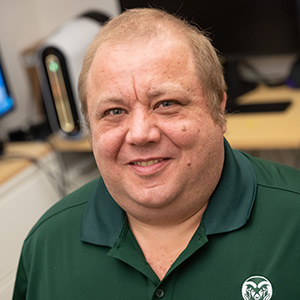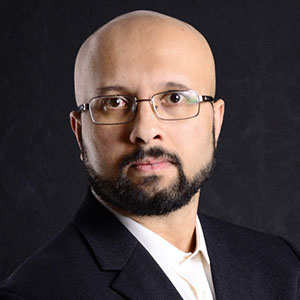Assistant Professors in the Department of Computer Science, Francisco R. Ortega and Vinayak Prabhu, have been awarded a combined total of $1.13 million from the prestigious National Science Foundation Faculty Early Career Development (CAREER) Program.
The CAREER Award recognizes early-career faculty who have the potential to serve as academic role models in research and education and to lead advances in the mission of their department or organization. The award funds a 5-year research project with an educational component and supports faculty in building a firm career foundation.
“Having two assistant professors win CAREER awards in the same year certainly speaks to the award-winning quality of our faculty,” said Department of Computer Science Chair Bruce Draper. “Even more importantly, however, both Francisco’s and Vinayak’s work reach beyond traditional computer science boundaries to address multidisciplinary challenges in fundamental areas such as human-to-machine communication and applying critical thinking to real-world systems.”
Francisco R. Ortega is making augmented reality more accessible

Augmented reality (AR) glasses are set to transform our everyday tasks and interactions in workplaces, education and entertainment.
Improving how users interact with AR head-mounted displays is essential to this transformation. AR systems must evolve to understand the subtleties and complexities of human communication, which is refined and a complex combination of modes – gestures, speech, text, gaze and more.
Current AR head-mounted systems use controllers or minimal interaction, making them less intuitive.
To address this issue, Ortega’s CAREER project, titled “Microgesture and Multimodal Interaction Techniques for Augmented Reality,” will develop techniques for recognizing microgestures – simple, small finger movements, like controlling the volume on a car radio. The microgesture interaction techniques will be combined with additional communication modalities to construct a unified interaction framework. The framework will be evaluated in an immersive analytics system and the results used to produce a Multimodal Interaction Toolkit, an open-source library for the Unity Game Engine.
This research will explore novel ways to interact with complex 3D environments and lay the groundwork for creating intuitive and accessible human-AR interaction systems.
“As director of the Natural User Interaction Lab, we aim to reduce the barriers to interaction in augmented reality and the entire spectrum of extended reality technology, allowing users to concentrate on their tasks rather than the technology itself,” Ortega said. “This award will allow us to implement new microgestures for AR as well as other inputs such as speech and pen, and use of all of them at the same time. I’m excited this valuable research project has been recognized by U.S. Congressman Joe Neguse.”
The education component of this project will produce the first comprehensive multimodal interaction textbook in the field, AR Multimodal Interaction: Theory and Practice. Chapters will include videos, hands-on activities and discussions to accommodate multiple learning styles.
In addition, Ortega will create a massive open online course for the emerging field of immersive analytics – a research area that leverages interaction and display technologies to help users collaborate, analyze data and make decisions. The course will be offered free of charge.
Vinayak Prabhu is creating tools to build reliable cyber-physical systems

From robots and intelligent infrastructure to implanted medical devices and self-driving cars, cyber-physical systems (CPS) are transforming how we interact with our physical world.
Cyber-physical systems are computer systems comprised of control software, sensors and hardware that continuously interact with the physical environment.
It is crucial that these systems function reliably. Faulty behavior can have potentially disastrous consequences, including loss of human lives.
Prabhu’s CAREER project, titled “Designing Robust Cyber-Physical Systems: Logics, Automata, Optimization, and Heuristic Methods”, aims to tackle this problem by developing algorithms and tools, underpinned by formal methods-based techniques, for requirement specification, testing and analysis.
This research will produce robust theories for CPS. “CPS is a relatively new area,” said Prabhu. “As computers become more powerful, it allows us to do more scalable analysis for more complex systems.” This award will help Prabhu’s research group develop logical specification formalisms for specifying nuanced engineering requirements. The group will then develop tools for automated testing and monitoring of CPS that use these specification formalisms.
The new tools and techniques will facilitate the development of dependable, next-generation cyber-physical systems.
Prabhu is also passionate about facilitating critical thinking in students. The education component of his project will focus on revamping undergraduate and graduate courses to rigorously train students on critical analysis techniques like logic, algorithmic reasoning, computing theory and CPS foundations. Because these core skills have broad utility across several research areas and disciplines, the courses will be made accessible to both computer science and non-computer science majors.
“Just like gyms aren’t only for Olympic athletes, theoretical training isn’t only for mathematicians,” Prabhu said. “Theory can be made accessible to, and benefit, people of all backgrounds.”
In addition to course updates, the award will help fund undergraduate research internships in CPS. Prabhu is excited about sharing his research area with students. “These closely mentored internships will augment the coursework and involve undergraduates at the forefront of CPS research,” he said.